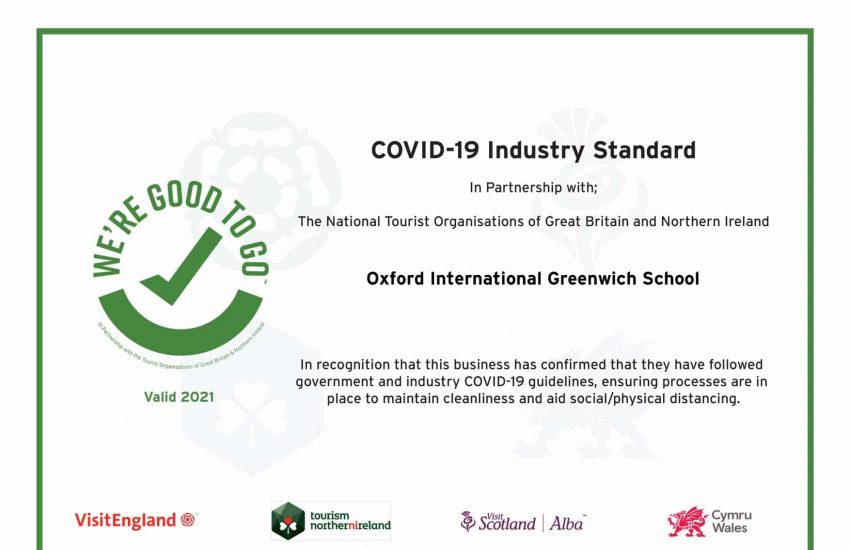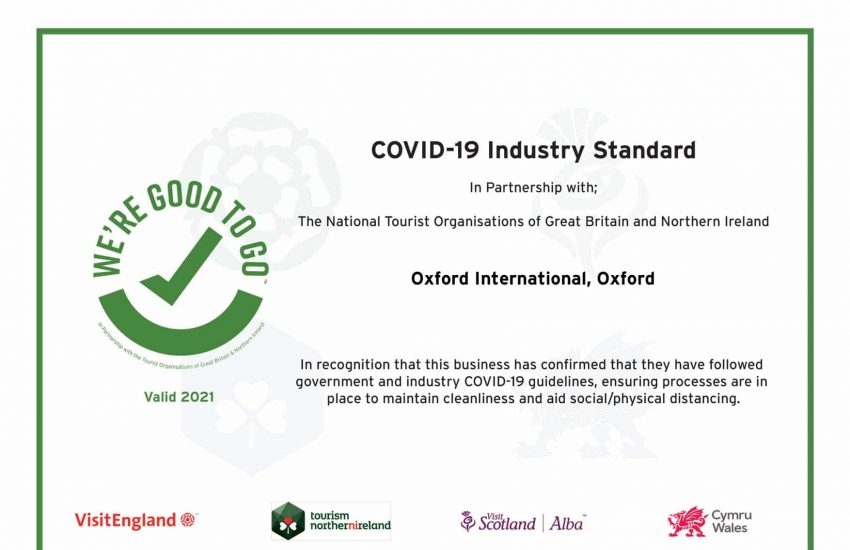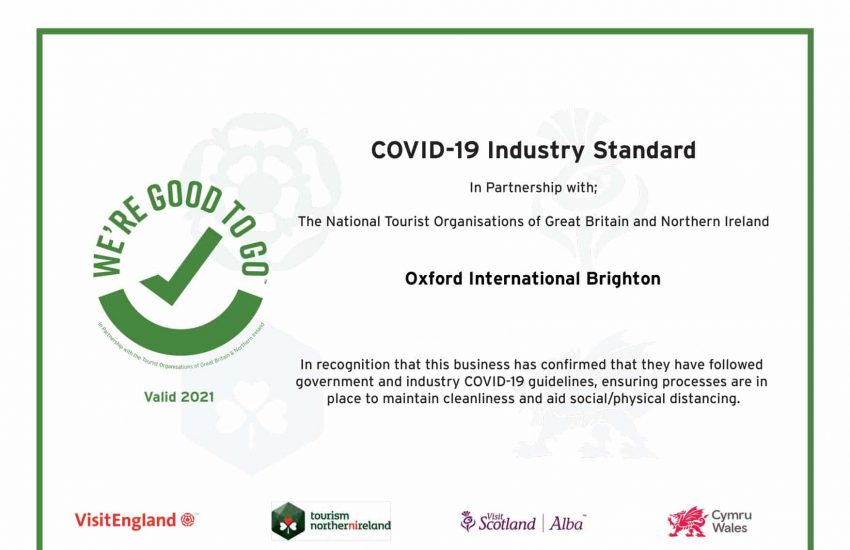COVID-19 FAQs for English Schools in the UK
School/Centre operations and contingency planning
Are the schools closed?
Following current government guidance, our UK schools in Brighton, London Greenwich and Oxford remain open and are currently accepting new students. Our schools in Toronto, Vancouver and San Diego are now open again too. See full information on travelling to our schools in North America here.
All our schools have implemented COVID-19 safety measures, read more about these safety measures here.
We are also offering an extensive range of online courses for students who are unable to join us face-to-face.
Will there be a quarantine period for international students?
Students will not have to self-isolate if they are arriving in England from a country or territory on the travel corridors list. All other international visitors are required to quarantine for 14 days. For students who wish to join Oxford International English Schools while this requirement is in place, we have prepared a quarantine learning package that includes online classes via the Virtual Classroom, homestay accommodation and transfers that are COVID-Compliant. Following their quarantine period, students can join our in-person classes and choose their preferred accommodation option.
Can I join the school if I already live in the UK or have been in the UK for more than two weeks?
Yes, you can join our UK schools if you have been in the UK for longer than two weeks. Students who reside in the UK and students who have been in the UK longer than weeks are able to join our in-person classes.
What is the school/centre doing to protect the community?
At Oxford International, we take student health and welfare very seriously. Over the last 29 years, we have had the experience of dealing with SARS, MERS, Swine Flu and Brid Flu outbreaks and other elements outside our control. In all of these cases, our procedures have ensured that all students can enjoy their course without interruption and return home safely.
Full Risk Assessments are held at all our UK schools and all students are free to check through these whilst at the centres. All our schools have robust policies and procedures for dealing with COVID-19. We are working in tandem with the government and public health bodies to ensure the best possible response to any potential situation.
Below is a summary of the key processes in place at all our UK schools.
- All staff are trained on how to check for symptoms of COVID-19 and to look for and recognise anyone showing signs of illness.
- Each school is connected to a local health centre and hospital should the need arise to recover a student for any illness or accident that may occur.
- Each school is equipped with adequate amounts of pocket-handkerchiefs, hand sanitisers and hand soaps so everyone will be able to follow Government advice on minimising the risk of infection.
- Students will receive clear instructions on arrival on how to avoid infection.
- Welfare officers in each of the schools are available to provide support, answer questions and discuss any concerns that students may have.
Cancellation policy and other guidance
What is your cancellation policy?
We have adjusted our cancellation policy to reflect the current unprecedented conditions and whilst we would like you to try to defer student’s courses to a later date or to encourage them to join our online lessons, although we understand that some students may not be able to do so. We will, therefore, refund tuition fees received in full less a GBP50 administration fee. This will apply to all cancelled courses during the period affected by coronavirus. We will require a minimum of 7 days’ notice in order to refund all the accommodation fees. If notice is shorter than this period it will incur a cancellation fee equivalent to one week of accommodation fees. Cancellation should always be made in writing and you will receive confirmation of cancellation by return. In order to avoid any bank transfer fees we will be happy to hold any refunded fees on your account for use against future bookings.
What is the advice for Year-Round Junior Groups?
If groups cannot travel due to a ban issued by the government, the first option will be to reschedule the programme. At this time, any monies paid will be kept on your agency account and transferred over to the rearranged group. If the group decides not to travel once the ban has lifted, you will have the option to transfer any paid monies over to any other future bookings you have made. If no future bookings have been made at this time, we will be able to hold your money on your agency account for use against any future bookings. If the group insist on cancelling their trip entirely and not rearranging, we will provide a full refund barring any elements of the programme that may be non-refundable, e.g some hotel room bookings, entrance fees, etc. For elements of the programme that we cannot offer a refund, we advise that in this instance you submit a travel claim to your insurer. All cancellations should be made in writing and you will receive confirmation of cancellation by return. Programmes will not be cancelled unless we receive written communication from you.
General Health
What is coronavirus (COVID-19)?
COVID-19 is a new illness that can affect your lungs and airways. It’s caused by a virus called coronavirus.
What are the symptoms of coronavirus and how is it spread?
The symptoms of coronavirus are:
- a new and continuous cough
- a high temperature (37.8 degrees or above)
Because it’s a new illness, it is not known exactly how it is spread but it is probably in water droplets transferred by coughing or sneezing.
I am displaying symptoms of coronavirus. What should I do?
Please do not come into College or go to a GP surgery, pharmacy or hospital. The current medical advice is that you and anyone else in your household should stay at home for 14 days if you have either:
- a new and continuous cough
- a high temperature (37.8 degrees or above)
Use the 111 online Coronavirus service to find out what to do next. If you only have mild symptoms, you won’t be tested. If requested to stay at home, please inform the College.
If your symptoms worsen during home isolation or are no better after seven days contact NHS 111 online at 111.nhs.uk. If you have no internet access, you should call NHS 111. For medical emergencies only, dial 999.
What precautions should I take?
Please maintain good hand, respiratory and personal hygiene. This advice includes:
- Wash your hands with soap and water often – do this for at least 20 seconds
- Always wash your hands when you get home or into work
- Use hand sanitiser gel if soap and water are not available
- Cover your mouth and nose with a tissue or your sleeve (not your hands) when you cough or sneeze
- Put used tissues in the bin immediately and wash your hands afterwards
- Try to avoid close contact with people who are unwell
- Don’t touch your eyes, nose or mouth if your hands are not clean
- Clean and disinfect frequently touched objects and surfaces in the home and work environment.
I am being tested for, or have been diagnosed with coronavirus. What should I do?
Please do not come into College. Let us know as soon as possible and inform us as soon as you have the test results.
What do I do if I think either I or someone else has the coronavirus?
If you or someone else thinks they are displaying the symptoms of coronavirus, it is important to stay at home and avoid contact with other people. Do not go to a GP surgery, pharmacy or hospital. Use the NHS111 online coronavirus service to find out what to do next.
In the event of a suspected staff case please inform your line manager and the HR team (HR@oxfordinternational.com).
I have recently returned from another country. What should I do?
When you arrive in the UK, you must travel directly to the place you are staying and not leave until 14 days have passed since you were last in a non-exempt country, territory or island. This is known as ‘self-isolating’.
The 14-day period starts is counted from the day after you leave a non-exempt country, or territory or island. A non-exempt country, or territory or island is any country, or territory or island that is not on the travel corridors list.
If this affects you, please let (staff) your line manager know or (students) make your Senior Tutor aware.
The symptoms are defined as a high temperature (37.8 degrees and above) and a new, continuous cough.
You do not need to call NHS 111 to go into self-isolation. If your symptoms worsen during home isolation or are no better after seven days contact NHS 111 online at 111.nhs.uk. If you have no internet access, you should call NHS 111. For a medical emergency dial 999.
What should I do if I believe I am particularly vulnerable?
Public Health England has advised that those particularly vulnerable include:
- Those aged 70 and over
- Those under 70 with an underlying medical condition(ie anyone instructed to get a flu jab as an adult each year on medical grounds)
- Those who are pregnant
Public Health England advise those who are at increased risk of severe illness from coronavirus (COVID-19) to be particularly stringent in following social distancing measures (see ‘What is social distancing?’).
We understand you may be concerned if you feel you are more vulnerable to the coronavirus than others (for example if you are in the categories listed above, or have vulnerable family members). If you are uncertain, members of staff should speak to their medical provider in the first instance, and students should speak to their college welfare lead.
The College will support you as much as possible. Vulnerable staff should work from home. If you are not able to carry out your role remotely, you will be granted special paid leave. This guidance also applies to people who live with and / or care for elderly people and people with vulnerable health conditions.
If you have any more questions, please contact hello@oxfordinternational.com.




